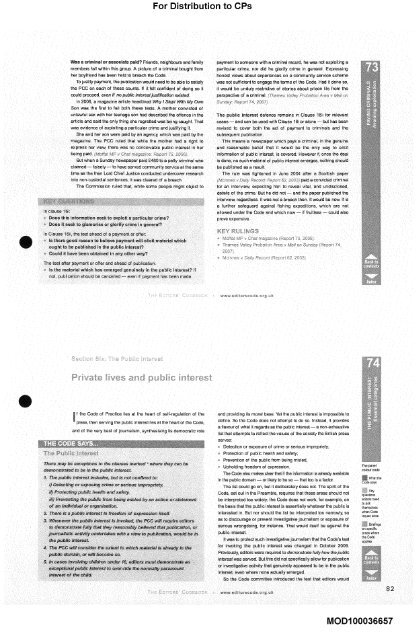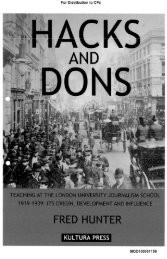The Edi ' - The Leveson Inquiry
The Edi ' - The Leveson Inquiry
The Edi ' - The Leveson Inquiry
You also want an ePaper? Increase the reach of your titles
YUMPU automatically turns print PDFs into web optimized ePapers that Google loves.
i ¸<br />
For Distribution to CPs<br />
Was a criminal or associate paid? Friends, neighbours and family<br />
members fall within this group. A picture of a criminal bought from<br />
her boyfriend has been held to breech the Code.<br />
To justify payment, the publication would need to be able to satisfy<br />
the PCC on each of these counts. If it felt confident of doing so it<br />
could proceed, even if no public interest justification existed.<br />
in 2006, a magazine article headlined Why I Slept With My Own<br />
payment to someone with a criminal record, he was not exploiting e<br />
particular crime, nor did he glorify crime in general. Exprassmg<br />
honest views about experiences on 8 community service scheme<br />
was not sufficient to engage the terms of the Code. Had it done so,<br />
it would be unduly restrictive of stories about orison life from the<br />
perspective of a criminal, 7;Sam~;~ V~d~ev Pr~1::~r; A~’e~ v Ma~[ cJ<br />
Sunda,¢ R~;#o ~ r4 2007~<br />
Son was the first to fail both these tests. A mother convicted of<br />
unlawful sex with her teenage son had described the offence in the <strong>The</strong> public interest defenca remains in Clause 16ii for relevant<br />
article and said the only thing she regretted was being caught. That cases -- and can be used with Clause 16i or alone -- but has been<br />
was evidence of exploiting a particular crime and justifying it. revised to cover both the act of payment to criminals and the<br />
She and her son were paid by an agency, which was paid by the subsequent publication.<br />
magazine. <strong>The</strong> PCC ruled that while the mother had a right to This means a newspaper which pays s criminal, in the genuine<br />
express her view, there was no conceivable public interest in her and reasonable belief that it would be the only way to elicit<br />
being paid. (Mo~ MI -~ v Chef m~mzi~e ~c~ 73 >*f;:~; information of public interest, is covered. However ,f, once the deal<br />
But when a Sunday newspaper paid £460 to a petty criminal who is done, no such material of public interest emerges, nothing should<br />
claimed -- falsely -- to have served community service at the same be published as a result.<br />
time as the then Lord Chief Justice conducted undercover research <strong>The</strong> rule was tightened in June 2004 after a Scottish paper<br />
into non-custodial sentences, it was cleared of a breach. {Mcfnri~ v Dmiy ~ecord: R~port 62 2003} paid a convicted criminal<br />
<strong>The</strong> Commission ruled that, while some people might object to for an interview, expecting him 1o reveal vital, and undisclosed,<br />
details of the crime. But he did not -- and the paper published the<br />
interview, regardless. It was not a breach then. it would be now, It is<br />
e further safeguard against fishing expeditions, which ere not<br />
al owed under the Code and which now if fruitless -- could also<br />
prove expensive.<br />
ch<br />
rest? If<br />
nade.<br />
[ the Code of Practice lies at the heart of self-regulation of the<br />
J press, then serving the public interest lies at the heart of the Code,<br />
and of the very best of journalism, synthesising its democratic role<br />
s ]~e!’n@s V~l~ ~ rarebit]on ~t@8 ~Ji g~ ~;.ttTO~ y ~e~ Sfl 74<br />
2007}<br />
and providing its moral base. Yet the public interest is impossible to<br />
define. So the Code does not attempt to do so. instead t provides<br />
a ~evour of what it regards as the public interest-- a non-exhaustive<br />
list that attempts to reflect the 4slues of the society the British press<br />
serves:<br />
Detection or exposure of cdme or serious impropriety;<br />
Protection of public health and safety;<br />
Prevention of the public from beinc misted,<br />
Upholding freedom of expression.<br />
<strong>The</strong> Code also makes clear that ff the information is alreaoy available<br />
in the public domain -- or likely to be so -- that too is a facto[<br />
<strong>The</strong> list could go on, but it deliberately does not. <strong>The</strong> spirit of the<br />
Coda, eat out in the Preamble, requires that these areas should not<br />
be interpreted too widely; the Code does not work, for example, on<br />
<strong>The</strong> panel<br />
;elour co[}e<br />
~ What the<br />
Code says<br />
Key<br />
eues~ions<br />
editors need<br />
~o as~<br />
the basis that the public interest is essentially whatever the public is mernse~ves<br />
interested in. But nor should the list be interpreted too narrowly, so when Code<br />
ssues arise<br />
as to discourage or prevent investigative journalism or exposure of<br />
senous wrongdoing, for instance. That would itself be against the ~ Briefings<br />
on s~edfic<br />
pu blic i nterest areas where<br />
It was to protect such investigative journalism that the Code’s test<br />
the Code<br />
applies<br />
for invoking the public interest was changed in October 2009,<br />
Previously, editors were required to demenslrale fully haw lhe public<br />
interest was served. But this did net specifically allow for publication<br />
or investigative activity that genuinely appeared to be in the public<br />
interest, even where none actually emerged.<br />
So the Code committee introduced the test that editors would<br />
MOD100036657<br />
82
















